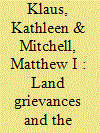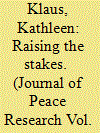|
|
|
Sort Order |
|
|
|
Items / Page
|
|
|
|
|
|
|
| Srl | Item |
| 1 |
ID:
191639


|
|
|
|
|
| Summary/Abstract |
Despite increasingly programmatic politics and competitive elections, political clientelism remains an enduring feature of African politics. More so, while politicians rarely deliver on political promises, citizens continue to demand and participate in patron–client relations. While moral economy and instrumentalist accounts offer insight into the puzzling persistence of political clientelism, we offer an additional framework based on demands for social recognition. Beyond expectations of materialist exchange or the performance of cultural norms, citizens expect their political leaders to recognize them as dignified human beings and members of an identity group. Drawing on evidence from three diverse African contexts—urban Ghana, rural Senegal, and coastal Kenya—we argue that citizens engage in political clientelism as a vehicle for demanding three dimensions of social recognition: (i) To be seen and heard by leaders, (ii) to be respected as agents in the political process, and (iii) to be politically included and protected from harm. By providing new insights into the enduring logics of clientelism, citizen strategies amidst unequal power relationships, and the role of emotions in democratic politics, we aim to reconcile existing approaches and bring them into a more unified framework.
|
|
|
|
|
|
|
|
|
|
|
|
|
|
|
|
| 2 |
ID:
141230


|
|
|
|
|
| Summary/Abstract |
Recent studies have asked why elites resort to violence, yet many overlook the process and dynamics of mobilizing violence. How do politicians convince their supporters to fight? This article argues that in multi-ethnic and democratizing societies where land and property rights are weak and politicized, land grievances can provide leaders with a powerful tool to organize electoral violence. We develop a theory to show how land grievances can give rise to violent mobilization when leaders frame elections as a threat to the land security of supporters or an opportunity to reclaim land or strengthen land rights. Conversely, land grievances are ineffective when citizens do not believe that elections signal a credible threat to their land security or an opportunity to strengthen land rights. We further specify how the type of land grievance shapes the logic and form of violent action. Grievances based on land insecurity shape a pre-emptive logic of violence, while grievances based on competing land claims often shape an opportunistic logic of electoral violence. The article examines the validity of our theory using a comparative case study between zones of escalation and non-escalation of violence during post-electoral crises in Kenya (2007–08) and Côte d’Ivoire (2010–11). By observing the variation between positive and negative cases, the article identifies factors that foment and constrain the mobilization of election violence.
|
|
|
|
|
|
|
|
|
|
|
|
|
|
|
|
| 3 |
ID:
170803


|
|
|
| 4 |
ID:
170804


|
|
|
|
|
| Summary/Abstract |
How does large-scale land reform affect electoral stability and the prospects for election violence? While scholars have theorized elite-level logics of land distribution, few studies analyze the effects of land reform on the attitudes of ordinary citizens, and the implications such reforms have for electoral violence. The article uses an original survey and qualitative interviews in coastal Kenya to examine the effects of the Kenyan government’s recent land titling campaign, the most ambitious and extensive since independence. It theorizes and tests the micro-mechanisms through which the selective distribution of land rights in the pre-electoral period heightens or lowers the stakes of an electoral outcome by altering levels of political trust and perceived threat. Results indicate that title deed beneficiaries are more likely to trust political institutions than non-beneficiaries. Yet, while title deed recipients are more likely to trust state institutions, they are also more likely to fear the electoral process compared to non-beneficiaries. The findings reveal how the perceived stakes of an election can vary across local spaces. Where political trust is low and threat is high, citizens may view elections as particularly high-stakes events and, thus, may be more willing to take on the costs of participation in violence to ensure their preferred political outcome, or to defend themselves against anticipated attacks.
|
|
|
|
|
|
|
|
|
|
|
|
|
|
|
|
|
|
|
|
|